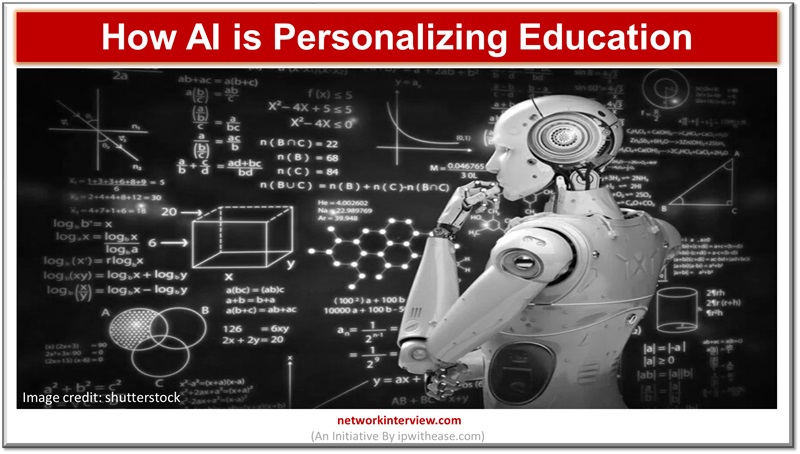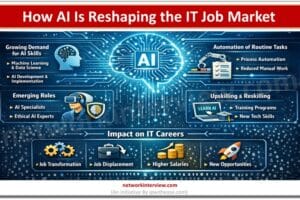
How AI is Personalizing Education for Students
Artificial Intelligence has become a revolutionary force in the quickly changing field of education, changing how teachers and students learn. Personalizing education to meet each student’s specific needs and learning style is a key component of this AI-driven transformation.
We’ll explore how artificial intelligence is changing education in this post, particularly emphasizing how earning a master’s in Artificial Intelligence might prepare teachers to take advantage of these tools to the fullest.
Role of AI in Personalizing Education
1. The Rise of Personalized Learning
Personalized learning involves tailoring educational experiences to meet individual student’s needs, allowing them to progress at their own pace and style. AI plays a pivotal role in making personalized learning scalable and efficient. Adaptive learning platforms powered by AI analyze data on students’ performance, preferences, and pace of learning to create a customized learning path.
Educators are increasingly recognizing the limitations of traditional one-size-fits-all approaches to teaching. Students have diverse learning styles, strengths, and areas that need improvement. AI steps in as a solution by providing a more nuanced and individualized approach to education.
2. AI and Adaptive Learning Platforms
Educational technology platforms leveraging AI algorithms can assess students’ strengths and weaknesses, adapting the curriculum in real time. For instance, if a student excels in a particular topic, the AI system may offer more advanced materials while providing additional support in areas where the student struggles. This dynamic approach ensures every student is included, fostering a more inclusive and effective learning environment.
3. Curriculum tailored for the future
A master’s program in artificial intelligence is crafted to be forward-looking, equipping educators for AI’s diverse scenarios and prospects in education. Typically, these courses encompass areas such as natural language processing, computer vision, and algorithmic decision-making. These acquired skills prove invaluable for crafting personalized learning experiences and nurturing students’ critical thinking and problem-solving abilities.
4. Customized learning paths
AI algorithms can analyze vast amounts of data, including students’ past performance, learning preferences, and extracurricular interests. This data is then used to tailor learning paths for each student. For example, if students prefer visual learning, the AI system can incorporate more multimedia resources into their lessons. On the other hand, if a student benefits more from hands-on activities, the AI system can suggest interactive simulations or experiments.
The result is a learning experience that resonates with each student individually, making education more engaging and effective. This customization caters to different learning styles and allows students to explore and excel in areas of personal interest.
5. Real-time Feedback and Assessment
One of the key advantages of AI in education is the ability to provide real-time feedback. Traditional assessment methods often involve waiting for exams to be graded, leading to a time lag in addressing students’ misconceptions or struggles. AI algorithms, however, can instantly assess students’ progress, identifying areas needing improvement and offering targeted feedback.
For instance, if a student consistently struggles with a specific concept, the AI system can provide additional resources, suggest alternative learning materials, or recommend targeted interventions. This enhances the learning experience and allows educators to intervene promptly when necessary, preventing students from falling behind.
6. Intelligent Tutoring Systems
AI-driven personal tutoring systems can offer pupils individualized support. These systems provide a level of personalized support that is difficult to provide in typical classroom settings by adjusting to the student’s pace, learning preferences, and learning style. AI instructors can track a student’s progress over time, pinpointing areas for development and modifying the exercise difficulty level correspondingly. This guarantees that the educational process stays demanding yet doable.
Overcoming Challenges and Ethical Considerations
1. Addressing Bias in AI
While AI brings numerous benefits, addressing potential challenges, such as algorithm bias, is essential. Educators with a Master’s degree in Artificial Intelligence are equipped to understand and mitigate bias in AI systems, ensuring that personalized learning experiences are fair and unbiased for every student.
Bias in AI can manifest in various ways, such as gender or racial bias in recommendation algorithms. Educators with advanced AI knowledge can critically evaluate and modify algorithms to minimize bias, creating a more inclusive learning environment.
2. Balancing Technology and Human Interaction
AI should complement, not replace, human interaction in education. Striking the right balance is crucial; educators with advanced AI knowledge can navigate this integration effectively. A master’s program in artificial intelligence equips educators with the skills to harness AI to enhance, not overshadow, the human element of teaching.
An essential factor to remember is that technology should act as an enabler, not an obstacle, to seamless communication and comprehension. Educators well-versed in AI can cultivate an atmosphere where students derive value from the personalized learning experiences facilitated by AI while preserving the interpersonal connections integral to the learning journey.
Masters in Artificial Intelligence- Nurturing Education Innovators
The Role of Advanced Education in AI
As AI continues to reshape education, there is a growing demand for professionals with in-depth knowledge and skills in artificial intelligence. Pursuing a Master’s degree in Artificial Intelligence becomes a strategic choice for educators leveraging AI to enhance personalized learning experiences.
A master’s program in artificial intelligence goes beyond the basics. It provides educators with a comprehensive understanding of AI technologies, machine learning, and data analytics. By mastering these skills, educators gain the ability to integrate AI tools into their teaching methodologies, creating more engaging and personalized learning experiences for their students.
The future of education with AI-driven personalization
As we understand the future of education, it becomes evident that personalized learning driven by AI is a lasting paradigm. The infusion of AI into the educational framework heralds a new era of customized learning experiences, guaranteeing each student a chance to excel. Enrolling in a master’s program in Artificial Intelligence not only equips educators to lead this revolution but positions them at the vanguard of shaping education’s future, where innovation, inclusivity, and personalized learning stand as its foundational elements.
Final Words
In summary, integrating AI with education holds the promise of fundamentally transforming the teaching and learning landscape. AI-driven personalized learning experiences enable educators to address the varied needs of students, cultivating a more inclusive and efficient educational system.
Undertaking a Master’s in Artificial Intelligence represents a personal and professional dedication for educators, ensuring they remain at the forefront of educational innovation. As we look ahead, it’s clear that AI will persist in its crucial role, shaping a more personalized, adaptive, and ultimately more effective education system for every student.
Continue Reading:
Automation vs Artificial Intelligence
Data Science vs Artificial Intelligence



